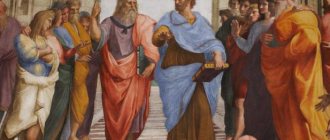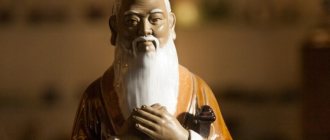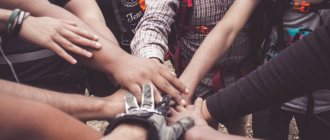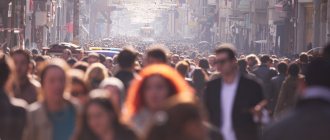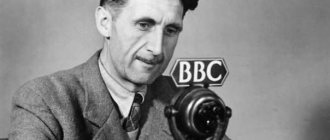Jean-Jacques Rousseau was born on June 28, 1712 in Geneva. French writer, thinker, composer. He developed a direct form of government by the people (direct democracy), which is still used today in Switzerland. Author of works - “The New Heloise”, “Emile”, “The Social Contract”, “Discourses”, etc. He died on July 2, 1778, Ermenonville, near Paris.
Aphorisms, quotes, sayings, phrases by Jean-Jacques Rousseau
- What is beautiful is what doesn't exist.
- Let childhood mature in childhood.
- Insults are the arguments of the wrong.
- Patience is bitter, but its fruit is sweet.
- Work hard to enjoy.
- All anger comes from powerlessness.
- Knowing good things is more important than knowing many things.
- Our true teachers are experience and feeling.
- Every idle citizen is a thief.
- A truthful heart is the main weapon of truth.
- To love deeply means to forget about yourself.
- By nature, people are not at all enemies of each other.
- In almost all things, the hardest part is the beginning.
- Only great events create great people.
- The spirit has its own needs, just like the body.
- It is important to know not what is, but what is useful.
- The first and most important quality of a woman is meekness.
- A clear conscience quenches the thirst for frivolous fun.
- You can resist anything, but not kindness.
- Straightforwardness adorns all the feelings it accompanies.
- The thirst for happiness never dries up in a person’s heart.
- False people are more dangerous to have as friends than as enemies.
- Some go to the grave at the age of a hundred, but die barely born.
- My job is to tell the truth, not force you to believe it.
- From the first minute of life we must learn to be worthy of living.
- Man was born free - and everywhere he is shackled in iron.
- A person's entire morality lies in his intentions.
- The less people know, the more extensive their knowledge seems to them.
- Thousands of paths lead to error, but only one to truth.
- The kingdom of a woman is the kingdom of tenderness, subtlety and tolerance.
- The incorruptible eye of an honest man always worries scammers.
- He who vilifies a decent person vilifies himself.
- Good use of time makes time even more precious.
- Affection can do without reciprocity, but friendship never can.
- The less you read, the more carefully you should choose your books.
- True politeness is about treating people kindly.
- To live in virtue, we must always fight with ourselves.
- The kindness expressed to us by any person binds us to him.
- Nothing powerful, nothing great can come from a corrupt pen.
- Life itself means nothing; its price depends on its use.
- To see injustice and remain silent means to participate in it yourself.
- The first reward of justice is the consciousness that one has acted justly.
- True education consists not so much in rules as in exercises.
- Take away the love of goodness from our hearts, and you will take away all the charm of life.
- Compulsion and love do not go together, and one cannot enjoy according to order.
- If we seek happiness without knowing where it is, we risk losing it.
- Fools are never shy, although shyness takes on all forms of stupidity.
- You will never be able to create wise men if you kill naughty children.
- The more violent the passions, the more necessary are laws to restrain them.
- There is an excess of severity and an excess of leniency: both should be equally avoided.
- If vanity made someone happy, then that someone was probably a fool.
- No matter how truthful a person may be, since he is a Catholic bishop, he has to lie.
- It is not at all necessary to make a philosopher out of a person before making a man out of him.
- The false can appear in endless combinations, but the truth exists only in one form.
- A wise legislator begins not by issuing laws, but by examining their suitability for a given society.
- A man philosophizes better than a woman about the human heart, but a woman reads the hearts of men better than him.
- All power is from God, I admit it; but also every illness comes from Him: does this mean that it is forbidden to call a doctor?
- Privileges of every kind are advantageous to the individuals who receive them, and a burden to the nation which bestows them.
- There is no need to confuse courage with arrogance and rudeness: there is nothing more dissimilar both in its source and in its result.
- We care most about life as it loses its value; old people regret it more than young people.
- There is only one moral lesson that is suitable for childhood and extremely important for any age - this is not to do harm to anyone.
- Of all human abilities, reason, which is the unification of all others, develops most difficultly and later than all.
- The upbringing of a person begins with his birth; He doesn’t speak yet, doesn’t listen yet, but he’s already learning. Experience precedes learning.
- A wife who seeks power becomes a tyrant of her husband, and a master who becomes a slave becomes a ridiculous and pitiful creature.
- Temperance and work are two true doctors of a person: work sharpens his appetite, and abstinence prevents him from abusing it.
- People, be humane! This is your first duty. Be like this for all conditions, for all ages, for everything that is not alien to man.
- The state of nature is that state in which our concern for self-preservation least harms the concern of others for self-preservation.
- It is a necessary consequence of the order of things that the evil man derives a double benefit: from his own injustice and from the honesty of others.
- If you yield to the child, he will become your master; and for that. to make him obey, you will have to negotiate with him every minute.
- Living does not mean breathing, it means acting. It is not the man who lived the most who can count the most years, but the one who felt life most.
- A bad deed torments us not when it has just been committed, but when after a long time you remember it, because the memory of it does not fade.
- If spouses have loved each other for many years, then love imperceptibly turns into a sweet habit and ardent passion is replaced by tender friendship.
- Keep in mind that ignorance never does evil; Only delusion is harmful. People are mistaken not because they do not know, but because they imagine themselves to know.
- A man says what he knows, a woman says what she likes; the first needs knowledge to speak, the second needs taste; the first should mean useful things, the second - pleasant.
- Every man born into slavery is born into slavery; nothing could be truer than this. In chains, slaves lose everything, even the desire to be freed from them.
- There is a lot of talk about the qualities of good upbringing. The first thing I would demand from him - and it presupposes many others - is not to be a corrupt person.
- When a man takes a wife below himself in rank, he does not humiliate himself, but elevates his wife; on the contrary, by entering into a marriage with a person of a higher rank, he humiliates her and does not elevate himself.
- Instead of curbing luxury by means of laws against luxury, it is better to prevent it by means of such management as makes it impossible.
- One of the advantages of good actions is that they elevate the soul and predispose it to even better deeds. The most dangerous pitfall for justice is prejudice.
- I am very afraid that the one who, from the first acquaintance, treats me as if we had been friends for twenty years, would treat me twenty years later as a stranger, if I asked him for an important favor.
- Anyone who depends on others and does not have his own internal means cannot become free. Alliances, treaties, people's trust - all this can bind the weak to the strong, but not the strong to the weak.
- Time is a moving image of motionless eternity. Anything that disrupts the unity of society is no good; all institutions that put a person in contradiction with himself are worth nothing.
- Eloquence produces a powerful, but momentary effect. People who are easily excited also calm down easily. Cold and powerful persuasion does not produce such a lift; but if it has gripped a person, it penetrates him, and its effect is indelible.
- The only way to keep the state in a state of independence from anyone is agriculture. Even if you have all the riches of the world, if you have nothing to eat, you depend on others. Trade creates wealth, but agriculture provides freedom.
- It is necessary to find such a general form of union that would protect and protect by its common strength the personality and property of each of its members and through which each, uniting with everyone, would, however, obey only himself, remaining as free as before.
- The homeland cannot exist without freedom, freedom without virtue, virtue without citizens. You will have everything if you educate citizens; Without this, everyone, starting with the rulers of the state, will only be miserable slaves. However, educating citizens is not a matter of one day; and in order to have citizen-husbands, you need to instruct them from childhood.
- Let the homeland reveal itself as the common mother of citizens; let the benefits they enjoy in their homeland make it dear to them; let the government leave them a sufficient share in the public administration to make them feel that they are at home; and let the laws be in their eyes only a guarantee for general freedom.
- Do not marry people who are suitable for each other only in certain living conditions and will not be suitable if these conditions change; but unite people who will correspond to each other, no matter what position they find themselves in, no matter what country they live in, no matter what rank they find themselves in.
- It is not difficult to understand that war and conquest, on the one hand, and increasing despotism, on the other, mutually help each other; that you can take money and people to your heart’s content from a people consisting of slaves in order to conquer other nations with their help; that the war provides both a pretext for new monetary extortions and an equally plausible pretext for constantly maintaining numerous armies in order to keep the people in fear. “No one can be happy unless he has his own respect.”
- To renounce one's freedom means to renounce one's human dignity, the rights of human nature, even its duties. No compensation is possible for someone who renounces everything. Such a refusal is incompatible with human nature; to deprive a person of free will means to deprive his actions of any morality.
- If we take this term in its exact meaning, then true democracy has never existed and never will. It is contrary to the natural order of things for a large number to rule and a small number to be controlled. It is impossible to imagine that the people spent all their time in meetings, engaged in public affairs, and it is easy to see. that he could not establish any commissions for this purpose, so that the form of government would not change.
- Two opposite states plunge people into the stupor of idleness: one of them is that peace of mind, due to which we are content with what we have; the second is insatiable lust, which makes one feel the impossibility of satisfying it. The one who lives without desires and the one who knows that he cannot get what he desires are equally inactive. To act, you need to both strive for something and be able to achieve it.
- We see around us almost only people who complain about their lives, and many who take their own lives when it is in their power; laws, divine and human, together are barely able to stop the disorder. Have you ever heard of a free savage even thinking about complaining about life and committing suicide? Judge with less arrogance about which side we see genuine human misfortune.
- It is not enough to tell citizens: “Be kind!” - “We need to teach them to be like that; and even the example, which in this regard should serve as the first lesson, is not the only means necessary here. Love for the fatherland is always effective, for every person is virtuous when his private will corresponds in everything to the general will; and we willingly desire the same thing that the people we love desire.
- People are naturally lazy; but a passionate desire for work is the first fruit of a well-ordered society; and if the people again fall into a state of laziness and indifference, then this is again due to the injustice of this same society, which no longer gives labor the value it deserves.
- The main driving forces that force people to act, if they are carefully considered, come down to two: voluptuousness and vanity; if you take away from the first what belongs to the second, you will find upon final examination that everything comes down almost to vanity alone.
- If you want to train your student's mind, train the powers that he must control. Exercise his body constantly; make him healthy and strong; let him work, act, run, scream; let him always be in motion; let him be a man in strength, and soon he will become one in mind... If we want to pervert this order, then we will produce early-ripening fruits, which will have neither maturity nor taste and which will not slow down: we will have young scientists and old children .
- Experience has long taught the people to be grateful to their rulers for the fact that they did not cause them all the harm that they could have caused them, and to adore their rulers when the people are not hated by them. A fool who is obeyed can, like anyone else, punish crimes - a true statesman knows how to prevent them; he asserts his respectable power not so much over actions, but, to a greater extent, over the will of people.
- Fear and hope are the two instruments by which people are controlled, but instead of using these two instruments without making any difference between them, they should be used in accordance with their nature. Fear does not excite, it restrains; and its use in penal laws serves not to induce good, but to prevent evil. It is not even visible that the fear of poverty has ever made idle people hardworking. That is why, in order to arouse real competition in work among people, it is necessary to show them that work is not a means to avoid hunger, but a way to achieve prosperity.
Biography facts and works
Rousseau was born into a simple family of a Genevan watchmaker. From a young age, he was forced to earn his living through various activities, wandering around France and Switzerland. He was a copyist of papers, a musician, a home secretary, and a servant in manor houses. Finding himself in the position of foster child in a rich aristocratic estate, Rousseau for the first time had the opportunity to engage in self-education and, through hard work, achieved extensive and versatile knowledge. He becomes a writer, but his life is still spent in constant unrest and wandering.
In 1749, the Dijon Academy announced a competition on the topic: “Has progress in the sciences and arts contributed to the improvement of morals?” By taking part in the competition, Rousseau created a talented work that aroused deep public interest. He argued that in ancient times, when people did not know civilization, they were more moral and happier. Then equality reigned, and differences between people were determined by natural reasons: abilities and work. Now people are artificially divided on the basis of their origin and wealth. Distrust, deception and enmity have taken over in human relations.
Soon Rousseau wrote two more sharp political treatises on pressing social issues. They raised his name to the heights of world fame.
In his work “On the Origin of Inequality Between People,” he for the first time clearly revealed the negative role of private property in the development of mankind. The root of all the evils of modern society lies, according to Rousseau, in inequality, and it arose with the advent of private property. Historical development increases inequality between people, and the masses are increasingly falling into poverty, while the rich, parasites and parasites, see no limit to their enrichment.
Rousseau fervently called for a fight against outdated orders in the name of the happiness and freedom of ordinary people. But how to eliminate the existing contradiction between the natural needs of man and the social conditions for their satisfaction? What should the future free society be like? Rousseau gave a vivid answer to these questions in his work “The Social Contract.” This work had a huge influence on the views of prominent figures of the French bourgeois revolution of 1789.
The Social Contract develops the idea of democracy. In the new state, created by the revolutionary energy of the people, all government institutions will be subordinated to the people's assembly, and the will of each citizen will be subordinated to state laws expressing the interests of all. People's power, according to Rousseau, is created through a general agreement, hence the title of the book. As for private property, although it was the cause of social inequality, Rousseau does not abolish it. He only demands that its size be limited, believing that everyone can be the owner of what they have acquired through personal labor.
Contribution to pedagogy
Despite the inconsistency and fallacy of a number of provisions, Rousseau's pedagogical teachings played an outstanding progressive role in the development of the theory and practice of education and made a significant contribution to pedagogy . His works are full of ardent love for ordinary workers and imbued with deep faith in their ability to create a new, free society. They glorify a humane attitude towards children and put forward creative methods for their upbringing and education. Rousseau hated parasitism and was an ardent advocate of labor education. His pedagogical ideas , like all socio-political teachings, enjoyed enormous popularity in France during the era of the revolution, and then received worldwide recognition. They were widely known in Russia and aroused warm sympathy from its prominent representatives.
N.K. Krupskaya, who highly valued the democratic teachings of Rousseau, noted that during the heyday of the capitalist system, bourgeois ideologists extolled Rousseau, and the modern bourgeoisie treats him with hostility and condescension, treats his ideas, calling them unrealizable. Rousseau was dear to the Soviet people for his ardent democracy and optimistic faith in the ability of working people to create a new society in which true freedom, equality and fraternity would flourish.
Did you like it? Click the button:
Jean Jacques Rousseau on education
Rousseau considered education to be one of the most effective means of reviving society . Pedagogical statements constitute an important part of his ideological heritage. In his famous novel “Emile, or On Education” and in other works (in particular, in the novel “The New Heloise,” which was read by the writer’s contemporaries), Rousseau argued that people from birth have good instincts, but become corrupted in the conditions of a deceitful civilization. Education should develop natural inclinations in a person and eliminate from his path everything that can distort them.
Rousseau's deep belief in the ideal nature of man made him a defender of the right of children to a happy life. He made a strong protest against feudal education based on violence against the child, when “the age of joys and happiness is spent in tears, punishments, slavery and under constant threats.” In contrast to this, he demanded love for children, providing them with conditions for free development, raising them in a natural environment, closer to nature.

